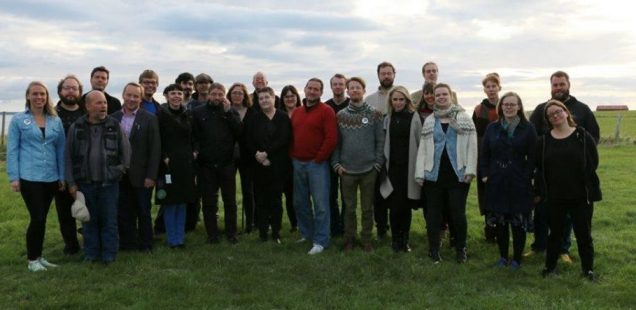Why Icelandic Elections Are More Important Than American | PirateTimes

Why Icelandic Elections Are More Important Than American
On Saturday, in the shade of the American presidential elections that dominates the daily global news, some more important elections are going to be held. They will take place in the land of ice and snow, the most northern country of Europe, Iceland.
This election is important because in Iceland we don’t have the usual “pretenders” to the power, but a pair that symbolizes the fight between the old world that is dying and the new one that is rising. The old is a traditional right-wing, conservative party which gives all power to the politicians. They stand against the radical, which believes in power of the base of the society, the grass root movements, the collective intelligence.
In USA we have the presidential election process with the two parties system, inherently undemocratic, which discourages voters’ participation. A system of “the winner takes it all” that decreases the importance of other political parties. In Iceland no single political party has ever governed the country, because no one has ever received the majority of the votes. All governments have always been coalition governments with the participation of two or more parties. The world’s first female prime minister was elected here in 1980 and in 2009 the first elected openly gay head of government. In short, on one hand we have the perpetuation of a situation and on the other the transition from the old to the new.
Elections in Iceland are more important than the US presidential election because something great is about to happen in Iceland, a change is gonna come for the good of humanity, the evolution of democracy. They are more important for the future of democracy and politics. Impacting civil and human rights, citizens’ participation in decision making processes, transparency, freedom of speech for the individuals and the media, the ratification of the first ever crowd-sourced Constitution. The new world and its values will emerge in Iceland, the old will sink and many other countries will follow.
Collective intelligence VS traditional politics (the silence of the media)
Although politicians supposedly are elected to represent the interests of citizens (of the many) they end up representing alien interests (of the few). They betray peoples’ trust and the recent Panama Papers leak is the greatest evidence. How can we oppose a system to the traditional politics? The answer lies in the collective, participatory democracy, by introducing the involvement of the citizens in decision making; It lies in the collective wisdom and intelligence, that can guarantee a better future.
In fact, a sort of collective intelligence has been practiced in Iceland, by the mobilization of the people and the revision of the country’s new Constitution. It was approved in 2012 in a referendum by more than 2/3 votes, but it still hasn’t been ratified by the parliament.
Passing through very difficult times citizens realized that they have to participate to not let politicians decide their future. The citizens took part both in a physical and a digital manner (the revision of the Constitution was made through the internet and social networks). The awareness of Icelandic citizens came through the crash that the country experienced in 2008.
However, the media (with a few exceptions) has not risen the attention to the recent situation before the elections (polls foreshadow that Pirates will be the winners). The media has also remained silent about a series of events that have taken place in Iceland. More specifically, how the country reacted when the IMF knocked on its door. This is why and how its leadership were forced by the citizens to mobilize in different roads than the traditional channels of reaction.
Thorvaldur Gylfason, professor of Economics at the University of Iceland, is one of 25 representatives in Iceland‘s Constitutional Council (in session from April to July 2011). He was elected by the nation and appointed by parliament to revise Iceland’s constitution and writes the following in opendemocracy.net:
“…Faced by pots- and pans-banging crowds in Parliament Square in Reykjavík in late 2008 and early 2009, the politicians admitted failure, accepting the protesters’ demands for, among other things, a new constitution…”.
There were also a banking debt referenda in 2010. The ‘Icelandic loan guarantees repayment referendum’ was defeated, with 98% voting against and less than 2% in favor and in 2011 it was also rejected by a majority of 60%. The silence of the media of the so called “Icelandic example” made it remain unknown by many.
Greece, the most southern European country, did not follow Iceland’s pathway, instead it accepted IMF. If Greece would have reacted in a parallel way to Iceland then things would surely have been tougher for the elites and better for the Greeks – but it’s never too late.
A swarm of pirates can bring real change
Rick Falkvinge, the founder of the pirate movement, has written a book titled “Swarmwise: The tactical manual to changing the world” that perfectly matches the case of the Icelandic pirate party.
A bunch of pirates (or better “a swarm of pirates”), founded the Pirate party of Iceland on November 2012 and on April 2013 they managed to elect three MPs in the Icelandic parliament. Since then its’ electoral influence was steadily growing. Looking at the polls we can see that Pirates ranked first for more than a year and now they are about to change not only Iceland but the entire world.
The swarm of Icelandic pirates redefines politics with their honesty. This attracts their fellow citizens who are sick and tired of the traditional parties and in search for something new. The “new” is the pirates, described as an anti-system party. Pirate Party Iceland chooses to not have a leader and instead deploying a collective leadership, which introduces direct democracy and espouses the participation of the citizens in deliberative and decision making processes.
Falkvinge, in his interview with Pirate Times, said:
“How a swarm of pirates can redefine politics”, among others commented that pirates are distinguished for their activism: “…It’s just that they’re not identifying as politicians – they’re identifying as activists in opposition to the politicians. What we’re doing is making the leap and bringing our values, the values of the net generation, into politics. In such a way, we are redefining what politicians and politics can be.”

Pirates: “we can hear you”
“Can you hear us now?” is the title of the campaign of the Icelandic Constitution Society (ICS) which aims to send a clear message to the politicians and reminds them who they work for. ICS wrote:
“We are asking voters in Iceland — whether on the right or left — to commit to vote only for parties that have promised to ‘make ratifying a constitution based on the 2012 draft a top priority in the new government.’”
Pirates have already said they will recognize the new Constitution.
Taking into account what has been happening in Iceland since 2008 and looking at the polls you can realize that the time for a change has come. That’s the message Icelanders send to all of us. They reject a political system that has been tested but failed and they do not want to waste any more time with that. They want to experiment with something new, since the mix of the old materials can not bring any different results! In a way, it looks like the Pirate Party in Iceland will come into power very soon.
If the Pirate Party Iceland forms the new government it will affect politics worldwide and surely increase Pirate parties’ influence in other countries. Let’s look at the citizens of Iceland and listen to their message. Especially the American voters should listen and think twice to whom and why they put their trust and vote on, some days later.
————
Further links related on the Icelandic Constitution reform:
Articles and videos on canyouhearus.is
The website of the Constitutional Council
dThe Pirate Party of Iceland
The candidates 2016 of the Icelandic Pirate Party

About Stathis Leivaditis
The English “pirate” is derived from the Greek word “πειρατής” (peiratēs) and this in turn from the verb “πειράομαι” (peiráomai), “I attempt”, which is a derivative of the noun “πείρα” (peîra), “experience”. Coming from the depths of the centuries, the word “pirate” took on another dimension in our days. The ruling classes saw pirates as rebels and hated them. Rebels without a state, they were not submissive to any law, except from the laws they instituted themselves, improvising together. This is the feeling of a Pirate: when something doesn’t work, you have to attempt to bring a new concept. Sometimes it goes beyond a certain point and perhaps exceeds certain limits, because it is an expression of challenge; the challenge to change the system. I’m a member of the Board (and former chairman) of Pirate Party of Greece, also a member of press team of PPGR, former journalist, now a free lancer. I’m in the team of Pirate Times from the start, I joined voluntarily and consciously because I am interested to meet pirates from around the world, to exchange views and spread the pirate spirit.













Andreas Kyriacou
pyrophilia
Colleen Pater